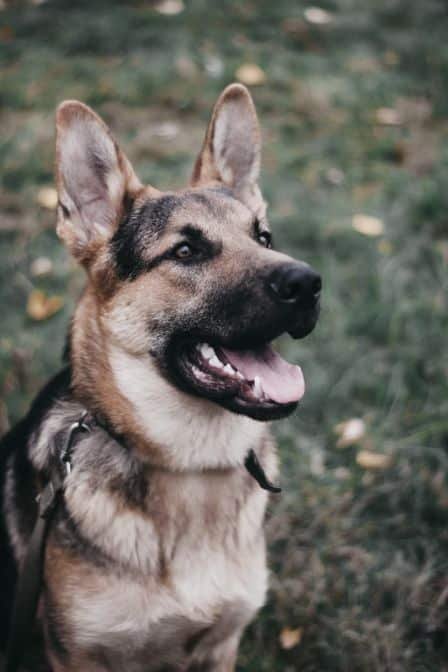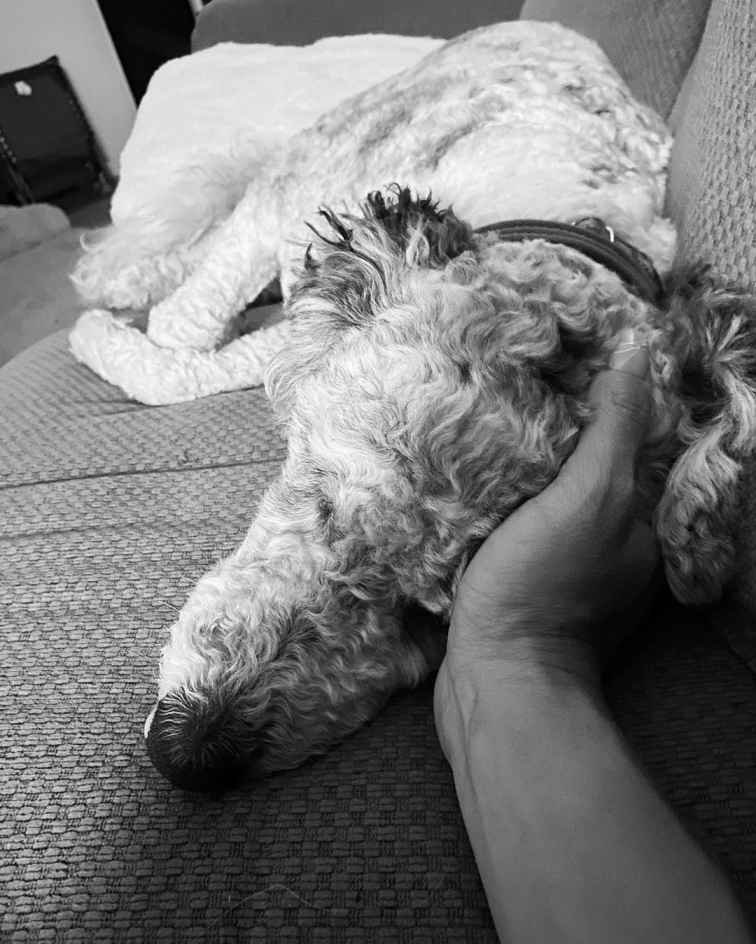The Shepadoodle comes from the German Shepherd and the Poodle. These two parents have almost opposite personalities, but this makes the Shepadoodle a very interesting breed.

Also known as Shepapoo or Shepdoodle, these designer dogs are intelligent and active dog breed. With basic training and sufficient activity, they are great dogs to have around. We have compiled everything you should know about the Shepadoodle. Keep reading to learn more about their build, temperament, grooming requirements, and more.
Shepadoodle Facts and Figures Summary
| TRAITS | DETAILS |
|---|---|
| Name: | Shepadoodle |
| Other names: | Shepdoodle, German Doodle, Shep-a-poo, Shepherdpoo |
| Parents: | German Shepherd & Poodle |
| Life span: | 12-14 years |
| Height: | 22-28 inches |
| Weight: | 50 – 90 pounds |
| Personality: | Intelligent, Loyal, Independent |
| Temperament: | Affectionate, Playful, Occasionally Quarrelsome |
| Shedding Level: | Low to Medium |
| Puppy cost: | $1700-$3000 |
What is a Shepadoodle Mix?
The Shepadoodle comes from an interesting mix of two dog breeds. These designer dogs were initially bred to work as police dogs in the military. At first glance at a Shepadoodle, it’s a bit difficult to believe they were once police dogs. But when you consider the fact that both parent breeds were also working dogs at the time, it becomes easier to understand. To know the details about most designer dogs, you need to know more about the parent breeds. Here is a short guide to the parents of the Shepadoodle: the German Shepherd and the Poodle.


German Shephard
The German Shepherd is a popular dog breed known to be highly energetic and intelligent. German Shepherds were initially farm dogs used to guide the animals and ward off predators. Today, they are household pets because they are loyal, playful, and friendly. However, because of their intelligence and active nature, they are also commonly used as police dogs or rescue dogs. German Shepherds are friendly, but if they are left alone with pent-up energy for too long, they could be destructive.
Poodle
The Poodle was also first found in Germany. Today, Poodles are household dogs, usually associated with wealth and luxury. Before these adorable dogs took a place in the home, they were originally water retrievers. They were hunting ducks and other birds for their owners. Poodles don’t do much hunting anymore, but they still have that energy in them. Even in the household, a Poodle should be given sufficient space to play around and time to go outside. If you don’t give a Poodle enough of its required mental and physical activity, it could affect its health. Poodles are also popular for their intelligence; they are among the smartest breed of dogs there are today.
Just like its parent breeds, the Shepadoodle was initially bred as a working dog, but today its adorable nature has made it a household pet. This breed of designer dogs get their intelligence and active nature from both parent breeds, with a mix of some unique features. Keep reading to learn everything there is about the Shepadoodle.
Shepadoodle Health & Appearance at a Glance
In terms of appearance, the Poodle and the German Shepherd dog breeds are completely different. The Shepadoodle puts these differences together to create an adorable and efficient dog. Many times, Shepadoodles differ in appearance based on the specific parent dogs they are bred from. If you want a specific appearance for a Shepadoodle, you should speak to a breeder. We have identified some common traits that constantly appear in Shepadoodles.

Build, Height and Weight
The size of your Shepadoodle could differ based on the size of its Poodle parent. If your Shepadoodle’s Poodle parent is of standard size, which is usually the case, then you would have a medium-sized dog. For the males, their height range from 22 to 28 inches, and their weight from 50 to 90 pounds. Female Shepadoodles usually have their height between 20 to 26 inches, and they weigh something between 40 to 70 pounds.
The general appearance of this designer dog is a mix of both parent breeds. They usually have the height and build of a German Shepherd to set them apart from a regular poodle. Their floppy ears and coat of poodle fur also ensure you don’t mistake them for a German Shepherd too.
Colors and Coat
Shepadoodles coats are medium length. The dog might take the straight and wavy coat from its German Shepherd parent, or it might take the curly and thick coat from its Poodle parent. The specific coat the dog takes usually depends on the breeding, but generally, Shepadoodles still look alike.
On colors, the options for a Shepadoodle are a mix of black, cream, gray, sable, and tan.
Life Expectancy and Possible Health Issues
Shepadoodles are healthy and active dogs; if they are well taken care of, they should be fine. If you groom your Shepadoodle and pay attention to the regular medical examinations, then he will have a long healthy life to spend with you. The lifespan of a healthy Shepadoodle is between 12 to 14 years.
When taking care of a Shepadoodle, you should also take precautions against these health problems. Hip Dysplasia, Addison’s disease, skin disorders, and Bloat are common health complications that dogs are susceptible to.
Shepadoodle Personality Traits
The Poodle and the German Shepherd are both household dogs, so you already know what to expect from a Shepadoodle. By nature, Shepadoodles are really active dogs, so they love playing games around the house. They are also a loving and friendly dog breed. This is why they are so popular for being household dogs.
Shepadoodle Temperament and Instincts
Shepadoodles are an intelligent breed of dogs. Their parent breeds are known for their intelligence in acting around or for human beings. Today, Shepadoodles still have lots of that intelligence stored in them. A Shepadoodle can do a lot more than just run around your house all day long. If you train them well enough, they can be a watchdog for your house; they could bark and alert people around when a stranger trespasses. Shepadoodles were once used as military police dogs, so this task is not foreign to them in any way.
Shepadoodles are also known for their gentle temperament, so they are not likely to hurt any child or do any damage to your house in a rage. They spend most of their time playing or jumping around to meet their daily activity requirement.
How to Care for a Shepadoodle?
Shepadoodles are not in the class of dogs that require high maintenance. Nonetheless, they still require a good amount of care. Most of a Shepadoodle’s needs can be taken care of from home, so it should not be too expensive to handle. These are some important things to note when taking care of a Shepadoodle.

Grooming and Shedding
Shepadoodles are not shedders; they usually shed only lightly or moderately. The stronger the Poodle parent’s genes are in the dog, the less shedding the dog will exhibit. Poodles are naturally low shedders, and they tend to pass this feature to the Shepdoodles.
Even though Shepadoodles are low shedders, they still need to be properly groomed so they don’t fall ill or carry parasites unknowingly. Shepadoodles are active dogs, so by running around, they usually get messed up in the dirt. A Shepapoo should be brushed down at least two to four times a week. Bathing can be done a few times a year because their hair does not hold a bad odor, and most of the time, a good brushing is enough.
To keep your pet absolutely safe, you should have periodic check-ups with the vet to ensure your dog is fully healthy at all times.
Diet and Feeding
If you get a Shepapoo pup, you should continue with what the breeder was feeding him. Before you make a change, ensure you consult your vet first. Shepapoos inherit gastric sensitivity from both parents, so their food must be quality and compatible with them at all times.
For adult Shepdoodles, two to four cups of quality dog food served as two meals in a day should be just fine. When feeding dogs, their age should determine the type of food they are given. Giving them the appropriate diet at the right age would aid their growth.
Activity and Exercise Requirements
Shepadoodles require lots of physical activity. Both parent breeds are active animals, so naturally, they are active dogs always looking for fun. The activity you are engaging this dog with has to be both mentally and physically stimulating. For an outdoor task, you can practice jogging, walking, playing fetch, and hiking, along with some agility routines. You could also keep your dog active with a chewing activity.
By not meeting a Shepapoos activity requirement, you are pushing the dog into a sad state, and he is also more likely to become obese. Daily activity does a lot for Shepapoos; as an owner, you should ensure they get enough of it.
How to Train a Shepadoodle?
Shepapoodles are really intelligent dogs, so they are able to pick up on training cues fast. They were actually bred to serve as military police dogs so that already gives away their fast learning capabilities.
When training a Shepapoo pup, you should introduce socialization and discipline while your dog is still a pup. Shepapoos are intelligent dogs, so basic reward-based learning is usually enough to get them to understand and keep up with the training. If training a dog new to you as an owner, you should contact a professional and let them handle it instead. Switching to negative reinforcement because you feel your dog isn’t learning fast enough is ill-advised. Let a professional trainer handle it instead.
Known Shepadoodle Health Problems
Shepadoodles are naturally a healthy breed of dogs; once they are well fed, given enough activity, and adequately groomed, they are likely to be fine. Irrespective of this, based on their connection with their parent breeds, there are some health conditions you should beware of as an owner.
Shepapoos parents and, by extension, the Shepapoo itself could be prone to Hip Dysplasia, Addison’s disease, skin disorders, and Bloat. In order to prevent any of these conditions from taking your pet away from you, you should have periodic appointments with a vet. Vets run checks on your dogs, and they could detect any of these conditions early. Once symptoms have been detected, then the disease would be eliminated. Your dog can then be back on his feet before the sickness ever got a chance to develop.
Daily Routine for a Happy Shepadoodle
Start your Shepadoodle’s day with a potty break. If he is still a pup, he should eat about four times daily; for an adult Shepapoo, you can limit his meals to two. Also, find a way around your schedule to make room for an hour of outdoor exercise for your Shepapoo. It doesn’t have to be done in one stretch; just ensure that an hour’s daily quota is met.
Even while you’re not around, your Shepapoo’s life is still going on. To keep him entertained, provide some items to play with and room to run around so he can be mentally stimulated even when you are not home.
Is a Shepadoodle the Right Dog for You?
Shepadoodles are adorable dogs, so by just looking at them, they look like the right dogs for you. But this might not actually be the case.
If you’re not the type of dog owner who spends a lot of time at home, then you should consider getting a less energetic dog. Shepapoos are really active and social, so they need to interact with others while also meeting their activity requirement for the day. If you can’t be there for your dog for a good part of the day, then Shepapoos are not for you.
Also, Shepapoos require moderate grooming. They need to be brushed two to four times a week, among other grooming requirements. If you were to own a Shepadoodle, you would have to be committed to meeting these requirements.
Should you buy or adopt a Shepadoodle?
The choice on whether to buy or adopt a Shepadoodle depends on your financial status. Presently, a Sheepadoodle pup would cost you between $1,700 and $3,000. Shepapoo breeders usually have a long list of orders for pups, so this makes the process of buying one a bit difficult. If you can pay and wait it out, you will eventually be rewarded with your Shepadoodle puppy. You can also get all the details about your dog and his parents from the breeder.
The alternative is to adopt a Shepadoodle at a rescue shelter. This costs a lot less, and you would be giving an adorable Shepapoo a new home.
FAQs about the Shepadoodle Cross-Breed
How often do Shepadoodles need to clip their hair?
Shepadoodles should have their fur trimmed every two to three months. They don’t shed their hair a lot, so it keeps growing. In order to keep it in shape and healthy, you should trim it regularly. You can handle it yourself, or you can let a professional handle it.
Does the German Shepherd Poodle Mix bark a lot?
No, Shepapoos do not bark a lot, except they are trained to. Naturally, these dogs have a very gentle nature, so they are cool around people and other pets. However, because of their intelligence, Shepapoodles can be trained to bark to ward off strangers and alert the owner.
Are Shepadoodles overly protective?
Shepadoodles were originally trained as military police dogs, so their protective nature is still in them. These dogs are still largely protective even when they have little training for it. While they are good for alerting you of strangers, you should not trust them with security.
What is the cost of a Shepadoodle pup?
A Shepadoodle pup costs somewhere between $1,700 to $3,000. If you are interested in paying less for a Shepapoo, you should run by animal shelters and try to adopt one there.
Is the Shepadoodle hybrid hypoallergenic?
Shepadoodles are not completely hypoallergenic; however, they are really close. These designer dogs take non-shedding traits from their parents, and this makes them less likely to trigger allergies with their fur. Some Shepapoos might shed hair more than others, so you should always confirm the exact status of the Shepapoo before you adopt it.
Will my Poodle German Shepherd breed turn grey?
Almost all Poodle genes have this trait of turning gray, so your Poodle German Shepherd is not an exception. Research has traced the source of this activity to stress, so while your Shepapoo already has the genes to start graying soon, you can help him prevent it.
Are Shepadoodles very aggressive?
Shepadoodles are gentle and friendly dogs, so no, they are not very aggressive. You should note that they are protective dogs, so they could get mildly aggressive at strangers if they have not been trained to act calm. 90% of the time, Shepapoos are not aggressive to anyone.
